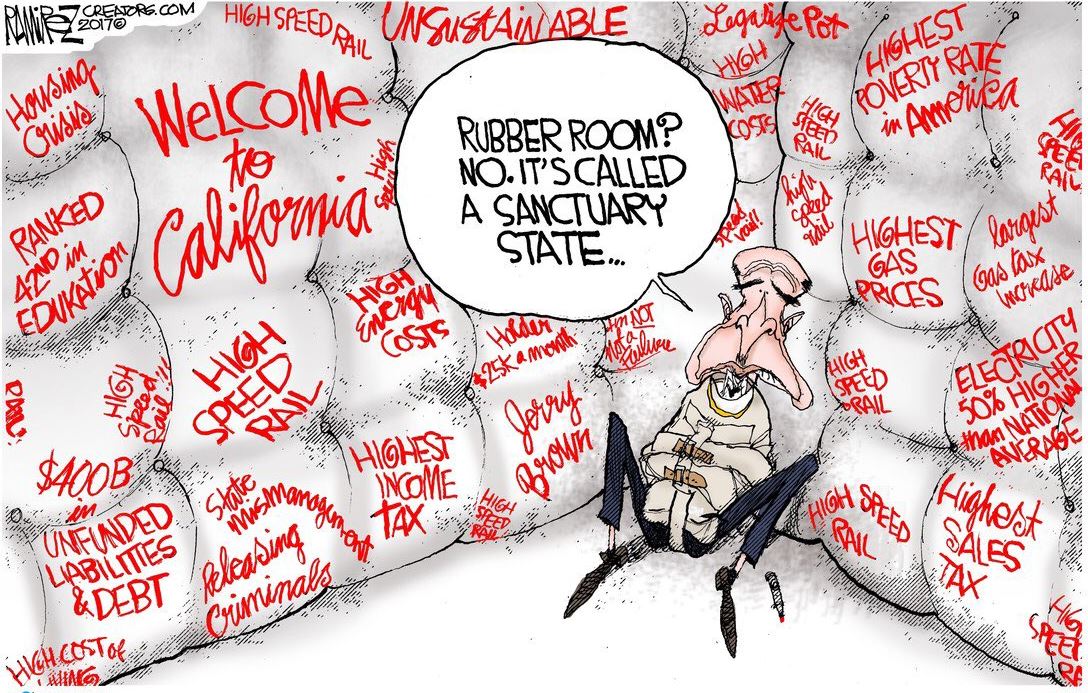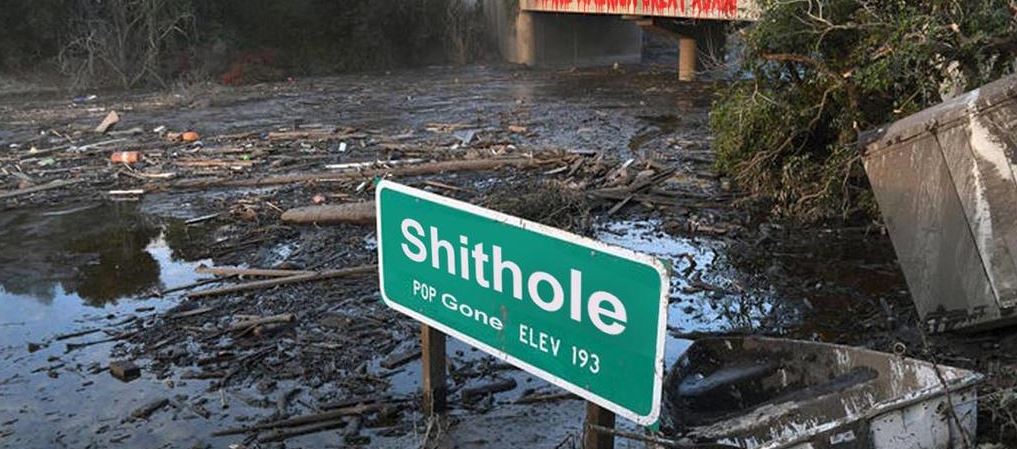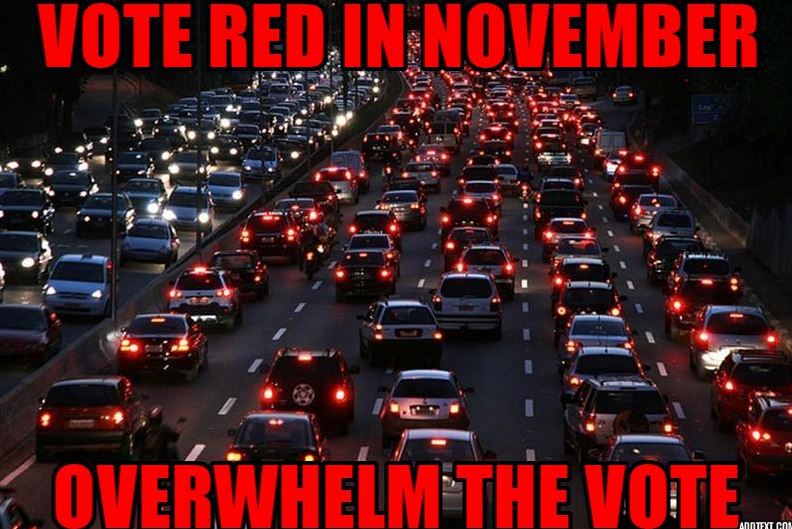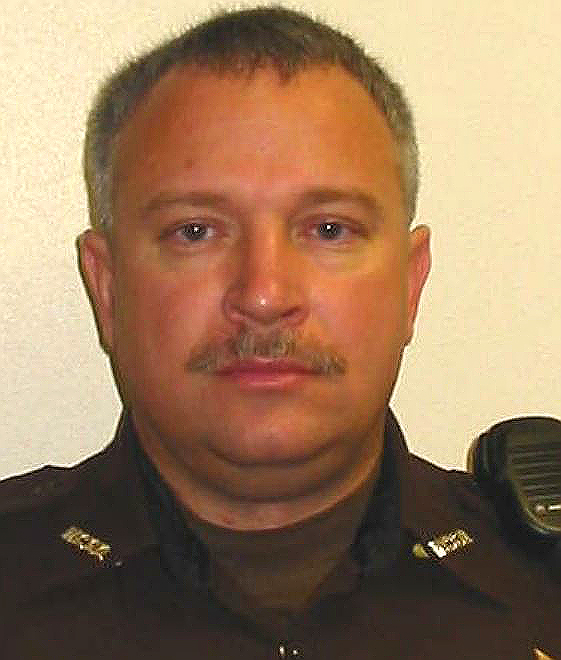 “Of course, BZ,” you exclaim, “that headline can’t be correct.”
“Of course, BZ,” you exclaim, “that headline can’t be correct.”
Except that, well, yes, it is correct. California currently excuses some cases of rape and, via a grand new bill signed by the addled Governor Jerry Brown (whom the CHP allows out in public only on certain monitored days of lucidity), may end up excusing murder.
They’ve laid the groundwork themselves via AB 1810. More on that later. “But where,” you may ask, “would California get the idea to excuse murder, BZ?”
Would it shock you if I were to suggest Canada? Is this headline sufficiently startling for you? From the VanCourier.com:
Strangling off-duty cop gave killer PTSD, defence tells sentencing judge
by Aly Thompson
HALIFAX — A lawyer for a Halifax man who strangled an off-duty police officer argues that his mental illness — brought on by the murder — should be a mitigating factor in deciding his parole eligibility.
Christopher Garnier, 30, was convicted in December of second-degree murder and interfering with a dead body in the 2015 death of 36-year-old Catherine Campbell.
The jury found that Garnier strangled Campbell, a Truro police officer, and used a compost bin to dump her body near a harbour bridge on Sept. 11, 2015, after the pair met at a Halifax bar.
The murder conviction carries an automatic life sentence, but a hearing to determine when Garnier will be able to apply for parole is scheduled for Monday in Nova Scotia Supreme Court.
In submissions filed with the court, defence lawyer Joel Pink said his client was diagnosed with post-traumatic stress disorder by a psychiatrist hired by the defence, Dr. Stephen Hucker, and by the psychologist who is currently treating him.
The event that brought on the PTSD: the murder itself.
“What a novel idea,” Leftists galloping under their purple-clouded skies say, clutching their safety pins, unicorns and Tide pods.
 Novel indeed. Let’s examine some of California’s past bills and propositions that ably assisted the realm’s proud acquisition of #1 Shithole State. What an accomplishment! (We’ll get to AB 1810 in a bit.)
Novel indeed. Let’s examine some of California’s past bills and propositions that ably assisted the realm’s proud acquisition of #1 Shithole State. What an accomplishment! (We’ll get to AB 1810 in a bit.)
First came Proposition 47, approved by California’s idiot voters in 2014. Yes, I’m talking to anyone and everyone who voted to shoot common sense in the head. Otherwise known in the California criminal justice system (yes, there is justice for criminals in California; just not for victims) as “realignment,” it placed the onus for housing and caring for hundreds and hundreds of serious felons — many whom had done time, for example, in Pelican Bay’s SHU for multiple murders or the murders of prison staff and other inmates — from secure state facilities into absolutely unprepared county facilities.
Low grade county facilities whose antiquated designs were better suited to house drunks, batterers, warrant violators and the like. Only some jails, like those in LA County for example, had the ability to house extremely violent offenders. Temporarily. And that space — as with space around all 58 California counties — was limited.
So limited that, operating under a consent decree, a number of County of Los Angeles buses (they’ve got a large fleet) were filled to capacity with inmates constantly driven around LA in order to avoid being accused, under that consent decree, of violating the maximum number of inmates housed within the jail during certain periods of time. I shite thee not. A 24/7 Inmate Bus Tour of LA environs.
Proposition 47 also reduced these crimes to misdemeanors:
- Penal Code Section 484: Shoplifting, or Attempted Shoplifting, where the value of property stolen does not exceed $950
- Penal Code Section 487: Grand theft, where the value of the stolen property does not exceed $950
- Penal Code Section 496: Receiving stolen property, where the value of the property does not exceed $950
- Penal Code §470-476: Forgery, where the value of forged check, bond or bill does not exceed $950
- Penal Code §476a: Fraud, or Writing a bad check, where the value of the fraudulent check, draft or order does not exceed $950
- Health & Safety Code Section 11377: Possession of Methamphetamine; Health & Safety Code Section 11350: Possession of Controlled Substance; Health & Safety Code §11357(a): Possession of Concentrated Cannabis: Simple possession for personal use of most illegal drugs1
The law includes simple possession of heroin and cocaine. Prior to Proposition 47, only simple possession of marijuana for personal use was a misdemeanor.
So check this out as well:
Proposition 47 also added a new misdemeanor section to the Penal Code: Penal Code section §459.5: Shoplifting, entering commercial establishment during regular business hours, with intent to commit larceny, where the value does not exceed $950 (or intent to commit larceny does not exceed that amount). If you could, prior to Prop 47, prove intent to steal (entering the store with concealed bags, etc), you could charge a felony under 459 PC. No more.
If you are charged with one of the above crimes, and eligible for Proposition 47, then you will only be charged with a misdemeanor, which means:
The conviction does not carry state prison time, as a felony conviction does. Misdemeanor convictions carry 6 months-1 year, as the maximum amount of jail time. With probation, no jail time may be possible.
Translated: A thief can now steal something valued under $950 on a daily basis and it will never rise to felony status. You want real world? Here’s real world:
“Every bicycle in our building has been stolen,” says Karen Burns, president of a San Francisco condo association. “I’ve caught so many people stealing packages. They don’t care. They know nothing will happen to them. It’s crazy. It’s horrible. I feel like these people need to go to jail.”
Proposition 47 didn’t stop with theft. The personal use of illegal drugs was also reclassified to a misdemeanor. Although the intent may have been kind (it’s cruel to punish people for having an addiction) and practical (they’ll emerge from prison hardened, and a felony on their record makes it more difficult to reintegrate into society), the downstream impact on the community at large has been disastrous. In San Fransisco, for example, shooting up in public is commonplace, whether it’s on the steps of City Hall, in front of a supermarket, or at the entrance to a children’s playground.
I have this video as proof.
Don’t believe the studies in California. Believe reality.
Residents who are experiencing an uptick in so-called low-level crimes in their neighborhoods are baffled by studies indicating otherwise. For example, a December 2017 Center on Criminal and Juvenile Justice report shows property crimes down by an average of 18.1 percent across the state. Those numbers are false, says Michael Rushford, president of the Sacramento-based Criminal Justice Legal Foundation, a nonprofit public-interest law organization: “More, not fewer, of these crimes are being committed, but people aren’t reporting them. In most cases they have to do it online, and they end up not doing it. They don’t believe anything will happen, so don’t see the point. And they’re right.”
But wait; there’s more.
Certainly San Franciscans aren’t debating whether or not crime is up. They know it is. In January, Police Chief William Scott acknowledged a 24 percent jump in property crimes from 2016 to 2017. Auto break-ins have soared in every district, and the arrest rate for them is an astonishing 1.6 percent. Citizens are right to feel disgusted and demoralized. In areas such as the Tenderloin, which is home for many of the city’s low-income immigrants, impoverished senior citizens, and families with young children, quality of life has deteriorated. Now more than ever, residents and merchants are living with a proliferation of addicts who roll up their sleeves, inject, and then nod off on the sidewalks or career down the street and into traffic. To fulfill customer demand, dealers sell packets of powder or pills in plain view of passers-by. There is no reason to hide. Why not shoot up wherever you want, leave bloody syringes in piles, steal, and deal when there are few if any consequences?
But there are repercussions, and they’ve felt by every person — young and old, rich and poor — who is robbed and lives among the growing cadre of drug users and dealers and what it’s all done to their neighborhoods.
Here’s a pertinent example from a defense law firm in California:
Herman is sitting in his car using cocaine, and a police car pulls up behind him. The police see that Herman has 100 grams of cocaine open, in addition to the actual cocaine he is using. The officers arrest Herman. Herman is charged and convicted of a felony under Health and Safety Code section 11350 for simple possession of a controlled substance for personal use. With the felony, Herman serves time in jail, loses his right to vote, sit on a jury, and has to inform potential employers that he has a felony conviction, when applying for jobs.
After Proposition 47:
Same scenario. Herman can only be charged and convicted of a misdemeanor conviction. His diligent attorney is able to negotiate a plea that does not include jail time. At the conclusion of his probation, he will be eligible for an expungement, and will not have to inform potential employers that he has been convicted of any crime, when applying for jobs.
What This Means:
Simple Possession of a Controlled Substance for personal use, under Health and Safety Code section 11350 is now always charged as a misdemeanor4. Unless Herman was arrested with scales, baggies, or any other indication that he intended to sell the cocaine in his possession, regardless of the amount, Herman can only be charged with a misdemeanor offense under Health and Safety Code section 11350, possession of a controlled substance for personal use.
Read that again: regardless of the amount. Herman can have an entire kilo of cocaine and it’s only a misdemeanor. I mean, hell, Herman will eventually get around to all of it, right?
Here’s another bit of reality:
(Criminal, Semisi) Sina said he rejoiced when he first heard about Proposition 47. He said he didn’t start stealing bicycles until the proposition raised the threshold for a felony theft to $950.
“Proposition 47, it’s cool,” Sina said. “Like for me, I can go do a [commercial] burglary and know that if it’s not over $900, they’ll just give me a ticket and let me go.”
He was sentenced to rehab five times this year but did not show up for a single session.
Man, that’s a forehead-slapper. Never saw that coming.
In Sacramento County, for example, theft cases aren’t even prosecuted for items under $950 in value. That means, in essence, you can steal with impunity. Guess what? Property crimes skyrocketed. And dope? Hell, marijuana is legal in California. Yet, California can’t manage to acquire a sufficient amount of dope for buyers, and many of those considering official sales are having second thoughts due to the regulations, policies and massive fees associated with distributors. Licenses easily run up to $75,000 and beyond. California thinks dope is going to be a perennial cash cow. Translated: the State of California could fuck up selling ice in hell.
How about California’s Proposition 57, passed by walking dead California voters in 2016?
Yet Proposition 47’s crafting was superior to what Californians witnessed in Proposition 57, which voters approved in 2016. This law made it easier for “nonviolent” felons to win parole. But again, its authors failed to sweat the details, using an existing, over-broad list of nonviolent crimes that included rape of an unconscious person and violent child abuse. The worst fears about Proposition 57 were confirmed in February, when a state judge ruled that the state could not retroactively rewrite the measure in a way that denied possible early release to thousands of violent sex offenders.
I know you’re still wondering: “what the hell does this have to do with murders in California, BZ?” Roll with me, we’re getting there.
From NBCLosAngeles.com:
Inmates with Violent Pasts Paroled Under Prop. 57
by Eric Leonard
A number of California prison inmates who committed violent crimes, including stabbings and shootings, have been granted parole under Proposition 57’s Nonviolent Parole Program, according to records obtained by NBC 4.
Prop. 57, approved by voters in 2016, promised to reduce the state’s overcrowded prisons by expanding parole eligibility for nonviolent criminals, and by encouraging inmates to take part in rehabilitation, therapy, and vocational programs.
How did California do that? Wait for it. Wait for it.
By reducing some more reprehensible crimes from felonies to misdemeanors. The proposition purposely changed the definition of a “violent crime” in California. Read this:
Some violent felonies that are now reclassified as nonviolent include rape of an unconscious person or use of a date rape drug, domestic violence, exploding a destructive device with intent to cause injury and assault with a deadly weapon.
No. I’m not kidding.
Among crimes not on that list — and therefore possibly viewed as nonviolent — are assault with force, rape of an unconscious person, battery with serious injury, some domestic violence, some child abuse and exploding a destructive device with intent to commit injury.
No. I’m not kidding. And yes, we’ve finally arrived at my headline reference. From the SanDiegoUnionTribune.com:
Now, in the worst example of rushed reform yet, Gov. Jerry Brown this week signed into law Assembly Bill 1810 — a budget “trailer bill” with no credited author that takes effect immediately. It includes a provision that appears to allow defendants charged with any crime to get the charges put on hold and perhaps eventually dismissed if they can persuade a judge that the offense resulted from a mental disorder that a mental health expert says is treatable.
A case can be made that a defendant’s mental illness should be considered by prosecutors and judges — it’s certainly relevant. Senate Bill 215, now before the Legislature, would have allowed this in defined, limited circumstances. But instead of vetoing AB 1810 and letting this debate proceed, Brown short-circuited it. He did so despite being warned by San Diego County District Attorney Summer Stephan that this is “the most irresponsible legislation our state has ever seen” and that it would “wreak havoc in our criminal justice system.”
You see where I’m going now. Any sort of a “mental issue” can now, in California, possibly yield some kind of a demented “get out of jail free” card.
If a defendant in California makes a claim that they committed a specified crime due to some sort of mental health problem — and the judge agrees — they may find themselves eligible for “diversion” instead of prosecution for said crime. But wait. It gets better. The defendant receives whatever “counseling” is decided to be appropriate. And once they’re declared to be “better” they don’t go back to court to stand trial for the offense; oh no. Their record gets sealed. And they walk out of the facility and out of court. A California criminal version of ServPro: “like it never happened.”
Let’s go down the list:
- No restitution? Check!
- No responsibility? Check!
- No input from prosecutors at all? Check!
- No protection of any victim or victims? Check!
- No chance to question anyone? Check!
- No chance to even question the psychiatrists involved at all? Check!
- No justice whatsoever? Double check!
Under the law, defendants who fall within the category of “mental disorder” include those who have the following illnesses: male hypoactive sexual disorder; sexual sadism; voyeurism; pyromania; oppositional defiant disorder and kleptomania.
The language in the bill only stipulates that the defendant “substantially comply” with diversion to earn a dismissal. What is the standard for “substantial”?
You will never know, as his or her record was expunged by a judge who gave this person an incredible break by allowing this two-year diversion program.
Diversion where? In a custodial facility? In an open-style halfway house in the community? At home?
Let’s examine the “disorders.”
- You could rape or kill (or both) a female because you have “male hypoactive sexual disorder.
- You could beat women unconscious, incapacitate them, penetrate them, commit mayhem, because you have “sexual sadism.”
- Women could beat men in the same fashion. We’re equal, after all.
- You could peep into windows or expose yourself to children, because you have “voyeurism.” Why stop there? You could climb inside the house and kill everyone.
- You could set fires or wildfires resulting in billions of dollars in damage, thousands of acres scorched, vegetation and trees eliminated, the air fouled for weeks and weeks with countless burning deaths, because you have “pyromania.”
- You could kill cops or anyone in any kind of an authority position — perhaps politicians or judges as well — because you have “oppositional defiant disorder.”
- You could steal anything and everything from now into perpetuity, because you have “kleptomania.”
Now re-read that article at the top of my post. Certainly we have a ready excuse for that. Hell, there may even be an app for that.
This is dangerous beyond dangerous, in a state that is already manic-depressive — and refusing to take its meds.
If anyone thought California politicians actually possessed brains, I must disabuse you of that execrable notion. They instead contain sweetbreads, giblets and loose marbles.
Boy, am I being kind.
And wow, shit is about to get real in California. Pass the popcorn.
BZ
P.S.
Avoid California. Do not come here, do not visit, do not drop by to see your Aunt Sharise, do not come here for a vacation, stay the hell away from San Francisco (unless you’re interesting in carting away some wild and festering communicable disease that won’t ever respond to antibiotics), don’t purchase food grown here, don’t buy plants or animals raised here but — more importantly — do your level best to ensure California keep its contagious and poisoned thoughts and policies within its own pus-ridden borders and, most importantly, import them not. Sometimes states exist as putrid examples of what not to do with a once-beautiful landscape.



 Imagine being a passenger.
Imagine being a passenger. Kleenex time.
Kleenex time.